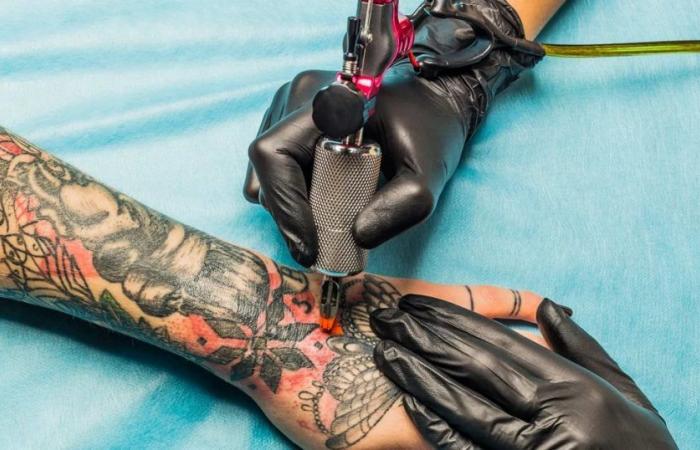make a tattoo It has become a very popular practice in the world. It is estimated that 12% of the population in the Russian Federation and up to 32% in the USAhave decided to follow the trend of making a permanent mark or design on the skin with tattoo ink.
Sweden is one of the most tattooed of the world: one in five inhabitants have become one. A group of scientists from that country wanted to detect if there were any long-term effects, and carried out a study which analyzed the possible consequences of this type of ink on the skin.
They identified what to do Tattoos could be a risk factor for the development of malignant lymphomaa kind of cancer of the lymphatic system, which is the part of the body’s network that fights germs. Although – they acknowledged – they consider that It is not a conclusive finding.and More studies should be done to improve the strength of the evidence.
The research was carried out by Christel Nielsen and Mats Jerkemanfrom Lund University, and Anna Saxne Jöud, from the department of oncology at Skåne University Hospital, Sweden. They published it in the magazine eClinicalMedicine.
Inks for use in tattoos are combinations of organic and inorganic color pigments. Colored inks may contain primary aromatic amines, black inks often contain polycyclic aromatic hydrocarbons, and metals (i.e., arsenic, chromium, cobalt, lead, and nickel) are found in ink of all colors, the researchers reported. Swedes.
In the study, the authors also noted that “a significant and concerning number of chemicals in tattoo ink are classified as carcinogens” by the International Agency for Cancer Researchwhich depends on the World Health Organization (WHO). In 2020, a group of experts from that agency had argued that studies on long-term effects were needed of these substances in an article published in the journal Cancer Epidemiology.
Over the past ten years, dangerous chemicals present in tattoo ink have been the subject of attention in Europe. There it was already decided restrict the use of some inks.
Meanwhile, it has been shown that ink injected into the skin does not stay there. The tattoo process causes a immune response which causes translocation of tattoo ink from the injection site.
“Deposition of tattoo pigment in lymph nodes has been confirmed, but long-term health effects remain unexplored,” the Swedish scientists wrote. So, they set out to evaluate what those effects were.
The thing is The human body perceives tattoo ink as something foreign that must be eliminated. An immune response is then generated that causes a large portion of the tattoo ink particles to end up in the lymph nodes. But it was not known how it could impact health.
consulted by Infobae, Graciela Manzurchair and head of the Dermatology division of the José de San Martín Clinical Hospital from the Faculty of Medicine of the Buenos Aires’ Universitypointed out: “When a person gets a tattoo, they are introducing a foreign material into their body, and it can react, triggering various pathologies: infectious, allergic reactions, and even tumors.”
Due to the potential consequences, the expert clarified that she does not recommend getting tattoos for her patients. “When they consult me, I explain the different complications they can have from a tattoo,” she said.
“The new study that associates tattoos with the risk of having lymphomas is a wake-up call“, highlighted the expert, who is part of the Ibero-Latin American College of Dermatology.
Swedish researchers conducted a large study to find out whether having tattoos could increase the risk of malignant lymphoma, a rare form of cancer that affects white blood cells. They used data from National Cancer Registrywhich includes all people diagnosed with cancer in Sweden.
The work, which received funding from the Swedish Research Council for Health, Working Life and Welfare, included people who had been diagnosed with lymphoma between the ages of 20 and 60 between 2007 and 2017. For each person with lymphoma, three random people of the same sex and age, but without the condition, were identified.
Participants answered a questionnaire about various lifestyle factors. Those who had gotten tattoos answered details such as what the size was, their age at the time of the first tattoo, and the colors they used. They participated in the study 5,591 people (1,398 cases and 4,193 controls).
When analyzing the data, People with tattoos were found to have a 21% higher risk of lymphoma than people withoutafter taking into account smoking habit and educational level (both are factors that may be associated with getting a tattoo and developing lymphoma).
The size of the tattoos didn’t seem to matter. What did matter was time: how long the participants had been tattooed. The risk appeared to be higher for new tattoos (received within two years) and for older tattoos (received more than ten years ago).
At the moment, the researchers considered that they cannot yet give specific recommendations to the population about the practice of tattooing based only on their study.
“More research is needed before I can do it. “But what the research tells us is that, for people with tattoos, it is important to be aware that they can have health effects and that you should seek medical attention if you experience any symptoms that may be related to the tattoo,” he said. the first author of the work, Dr. Nielsen, in an article in The Conversation.
The Swedish team is already looking for more answers. They are developing parallel studies on two types of skin cancer and are about to start new research to find out if there is an increased risk of conditions related to the immune system, such as thyroid disease and sarcoidosis.
In dialogue with Infobae, Gabriela Cinatmedical oncologist and head of the Melanoma and Sarcoma Functional Unit of the Oncology Institute “Ángel. H. Roffo” of the Buenos Aires’ Universityconsidered: “Tattoo pigments can be carcinogenic. But it must be taken into account that the result of the new study is not yet conclusive. “It clearly generates hypotheses for further investigation.”
But Dr. Cinat pointed out another implication of the tattoo: “Getting a tattoo can mask the beginning of a malignant skin lesion that needs to be diagnosed early, especially melanoma.”
Ariel Ostaddermatologist and clinical assistant professor of dermatology at New York University School of Medicine, told the site. Skin Cancer Foundation of the United States, that “it’s never a good idea to get a tattoo too close to (or on) a mole. Changes that occur in a mole (in its symmetry, border, color, size, shape or texture) are potentially key warning signs that the lesion may be evolving into melanoma or another type of skin cancer.” It is also not advisable to tattoo over a melanoma scar
The tattoo process breaks the skin. This means that skin infections or other health problems could occur later. Some of the risks of tattoos according to experts from the United States Mayo Clinic are the following:
- Allergic reactions: An itchy rash may occur at the tattoo site. Red ink tends to be more likely to cause allergic reactions than other colors of tattoo ink.
- Skin infections: This could occur due to contaminated ink or equipment that was not sterilized properly. If the tattoo is done in a center that does not comply with correct safety measures, it can also increase the risk of developing a skin infection.
- Other skin problems: Sometimes, an area of inflammation can form around the tattoo ink. This is known as a “granuloma.” Tattoos can also lead to “keloids,” which are raised areas caused by excessive growth of scar tissue.
- Diseases that are transmitted through blood. If the equipment used to make a tattoo has infected blood, you can get diseases such as methicillin-resistant staphylococcus aureus bacteria, hepatitis B, and hepatitis C. To reduce the risk, you can get the hepatitis B vaccine before getting a tattoo. A tattoo.






